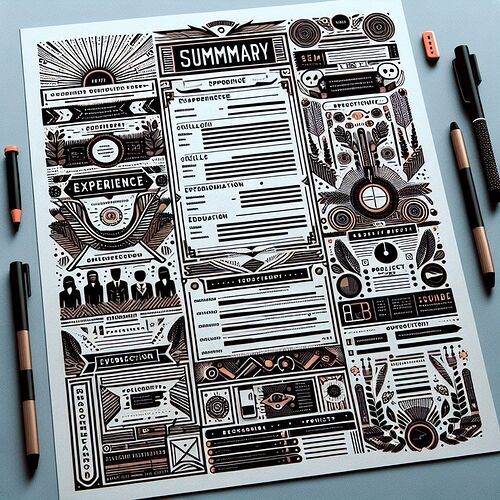Creating a resume can be a daunting task, especially if you are new to the job market. However, by breaking down the process into manageable sections, you can create a professional and effective resume that will stand out to potential employers.
Here are the essential sections to include in your resume:
- Contact Information
- Professional Summary
- Work Experience
- Education
- Skills
- Certifications and Awards
- References
1. Contact Information
This section should be at the top of your resume and include your full name, phone number, email address, and optionally, your LinkedIn profile or personal website. Ensure your email address looks professional.
Example:
John Doe
johndoe@gmail.com
(555) 555-5555
linkedin.com/in/johndoe
johndoe.com
2. Professional Summary
A brief 2-3 sentence summary that highlights your key qualifications and career goals. This section should be tailored to the job you are applying for.
Example:
Experienced marketing professional with over 5 years of experience in digital marketing. Proven track record of increasing online engagement and driving sales. Seeking to leverage my skills in a dynamic marketing team.
3. Work Experience
List your work history in reverse chronological order, starting with your most recent job. Include the job title, company name, location, and dates of employment. Use bullet points to describe your responsibilities and achievements.
Example:
Marketing Manager
XYZ Company, New York, NY
June 2018 - Present
- Developed and executed marketing strategies that increased sales by 20%.
- Managed a team of 5 marketing professionals.
- Collaborated with the sales team to create promotional materials.
4. Education
Include your educational background, starting with your highest degree. List the degree, institution, location, and graduation date. You can also include relevant coursework, honors, or extracurricular activities.
Example:
Bachelor of Science in Marketing
University of California, Los Angeles, CA
Graduated: May 2018
5. Skills
Highlight the skills that are relevant to the job you are applying for. These can be hard skills (e.g., programming, data analysis) or soft skills (e.g., communication, teamwork).
Example:
- SEO Optimization
- Content Marketing
- Project Management
- Team Leadership
6. Certifications and Awards
Include any relevant certifications, licenses, or awards that demonstrate your expertise and accomplishments in your field.
Example:
Google Analytics Certified
Certified: March 2020Employee of the Month
XYZ Company, January 2021
7. References
While it's not always necessary to include references on your resume, you can mention that they are available upon request. This shows that you are prepared to provide them if needed.
Example:
References available upon request.
By including these sections in your resume, you can create a comprehensive and professional document that effectively showcases your qualifications and experiences.
Did I miss anything? Add your comments below!
